1. Overview
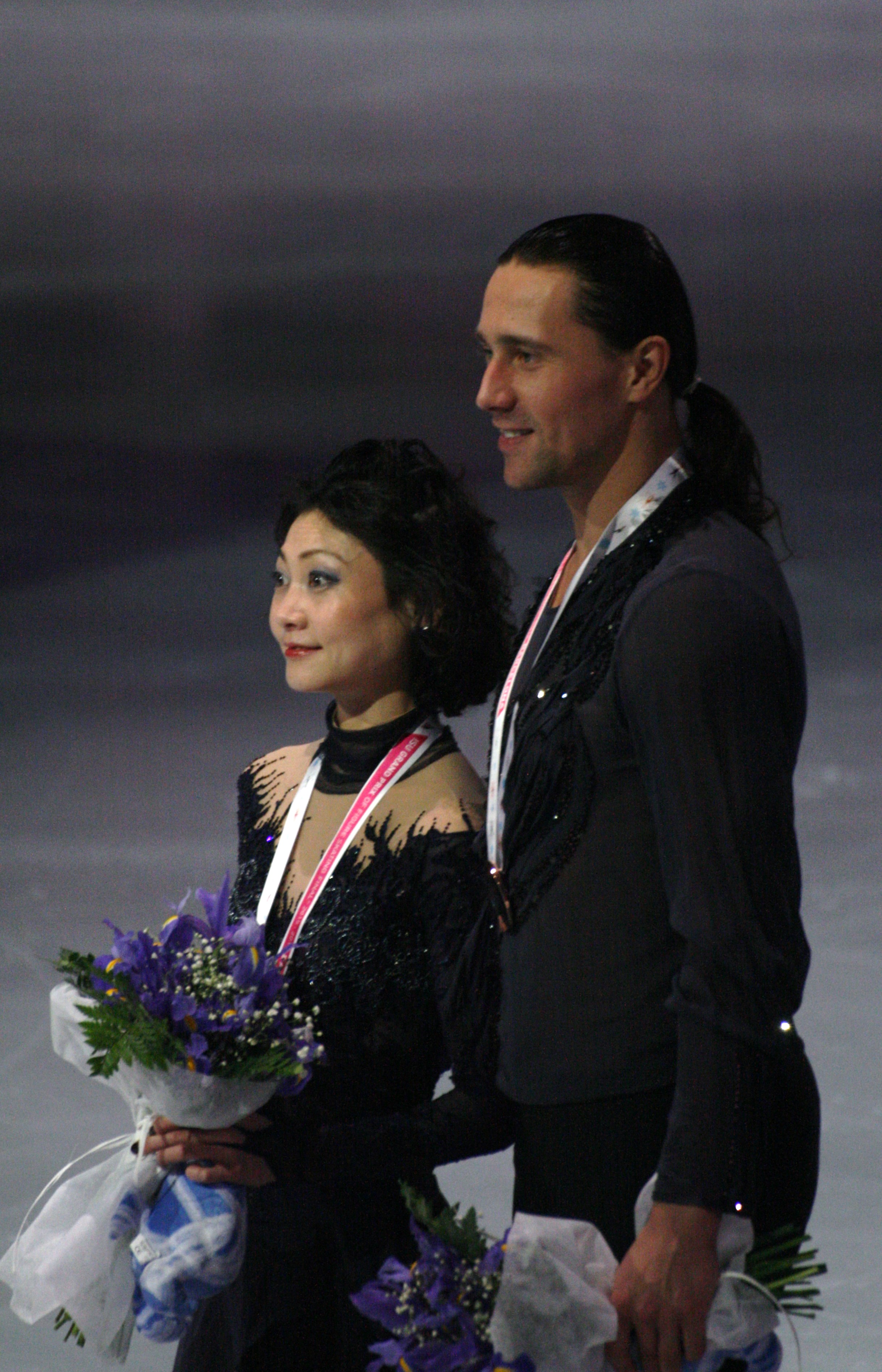
Yuko Kavaguti (Japanese: 川口 悠子Kawaguchi YūkoJapanese, Russian: Юко КавагутиRussian) is a retired pair skater who represented both Japan and Russia during her distinguished career. Born on November 20, 1981, in Funabashi, Chiba, Japan, she transitioned from a promising singles skater to an accomplished pair skater, ultimately forging a highly successful partnership with Alexander Smirnov for Russia. Their achievements include two European Championship titles (2010, 2015), two World Championship bronze medals (2009, 2010), and two ISU Grand Prix Final bronze medals. Notably, in 2015, Kavaguti and Smirnov made history by becoming the first pair to successfully land two quadruple throw jumps in a single program and the first to execute a quadruple throw loop.
Kavaguti's career is marked by her dedication and resilience, demonstrated through her significant decision to acquire Russian citizenship to pursue her Olympic aspirations, thereby forfeiting her Japanese nationality. Her journey highlights the intense commitment required in elite sports and the complexities athletes navigate across national boundaries. Post-retirement, Kavaguti has remained involved in figure skating through coaching and technical roles, while also pursuing a unique alternative career path outside the sport.
2. Early Life and Background
Yuko Kavaguti's foundational years and early exposure to figure skating laid the groundwork for her remarkable career.
2.1. Childhood and Early Training
Kavaguti began skating at the age of five, inspired by her mother's fondness for ice dancing. By the third grade, she had dedicated herself seriously to the sport. Initially, she competed as a ladies' singles skater for Japan, showcasing early talent in the discipline. A pivotal moment in her career occurred after witnessing Russian pair skater Elena Berezhnaya compete at the 1998 Winter Olympics in Nagano, Japan. Inspired by Berezhnaya's performance, Kavaguti decided to switch to pair skating. Her determination led her to repeatedly write to renowned coach Tamara Moskvina, who, after initially attempting to dissuade Kavaguti with warnings about the difficulties of training in Russia and demanding two challenging tests, eventually accepted her. Following this, Kavaguti relocated to Hackensack, New Jersey, where Moskvina was coaching at the time.
2.2. Education and Language Proficiency
During her skating career, Kavaguti pursued higher education, demonstrating a commitment beyond the ice rink. From 2003, she undertook studies in International Relations at Saint Petersburg State University in Russia, successfully completing her degree in June 2007. This academic pursuit contributed significantly to her linguistic abilities, making her fluent in three languages: her native Japanese, English, and Russian. Her academic background and multilingual skills led her to express an interest in a career in international diplomacy after her competitive skating.
3. Early Career in Japan
Yuko Kavaguti's early competitive career saw her representing Japan in both singles and, subsequently, pair skating.
3.1. Singles Skating Career
Before transitioning to pair skating, Kavaguti competed as a ladies' singles skater for Japan. She achieved notable results during this period, including a third-place finish at the 1997 All-Japan Junior Championships. In the 1998-1999 season, she participated in the ISU Junior Grand Prix series, where she secured a victory at the JGP Mexico Cup. However, her performance at the All-Japan Junior Championships that same season was less consistent, placing tenth overall after a challenging short program.
3.2. Partnership with Alexander Markuntsov
In March 1999, Kavaguti officially transitioned to pair skating, forming a partnership with Alexander Markuntsov to represent Japan. They primarily trained in Hackensack, New Jersey, under the guidance of coaches Tamara Moskvina and Igor Moskvin. Their programs were choreographed by a team including Tatiana Druchinina, Igor Bobrin, and Moskvina herself.
The pair quickly made their mark, becoming the first Japanese pair team to medal at an ISU championship when they earned a silver medal at the 2001 World Junior Figure Skating Championships. They also secured a bronze medal at the Junior Grand Prix Final during the 2000-2001 season, following a victory at the JGP Mexico Cup and a third-place finish at JGP China. In the senior circuit, they won consecutive All-Japan Championships in 2002 and 2003.
Despite their successes, Kavaguti and Markuntsov dissolved their partnership in May 2003. Kavaguti explained that a primary reason for their separation was the significant difficulty Markuntsov faced in acquiring Japanese citizenship, which was essential for them to represent Japan at the Olympic Games.
Following this partnership, Kavaguti briefly skated with American skater Josh Martin. However, their collaboration was cut short when Martin sustained injuries in May 2004 after being hit by a car while rollerblading to practice, leading to his return to the United States. Kavaguti then teamed up with another American, Devin Patrick. They competed at the Japanese Championships, where they won the national title in the 2004-2005 season, and also at the U.S. Championships, placing fifteenth. This partnership also concluded as Patrick desired to live in the U.S., while Kavaguti was unwilling to leave her coach, Tamara Moskvina, or abandon her university studies in Saint Petersburg. Concerned she might not find another partner, she remained determined to at least complete her degree.
4. Transition to Russia
Kavaguti's career took a decisive turn with her move to Russia, a strategic decision that shaped her future in figure skating.
4.1. Move to Saint Petersburg and Partner Search
In 2003, Yuko Kavaguti relocated to Saint Petersburg, Russia, following her coach Tamara Moskvina, who had returned there. In addition to continuing her skating training, Kavaguti enrolled at a university in the city, pursuing studies in International Relations. The move to Russia presented challenges, particularly in finding a suitable new pair partner after her previous collaborations. She had briefly partnered with Josh Martin and Devin Patrick, but these partnerships were short-lived due to injuries or differing residential preferences. Kavaguti's unwavering commitment to remaining with Moskvina and completing her education in Saint Petersburg was a key factor in her decision-making during this period of transition and partner search.
4.2. Formation of Partnership with Alexander Smirnov
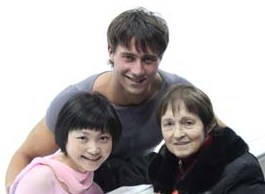
The turning point in Kavaguti's career came in May 2006 when she formed a new partnership with Russian skater Alexander Smirnov, with the intention of competing for Russia. Kavaguti made the decision to skate for another country due to the ongoing difficulties she faced in finding a compatible and competitive partner. Smirnov himself acknowledged Kavaguti's exceptional work ethic, stating that he was "really amazed by her work level." The new pair trained at the Yubileyny Sports Palace in Saint Petersburg. Although they initially worked with Nikolai Velikov, Kavaguti's long-standing training relationship with Tamara Moskvina since 1998 led her to prefer remaining under Moskvina's guidance. Consequently, Kavaguti and Smirnov began training with Moskvina in August 2006, laying the foundation for their highly successful collaboration.
4.3. Acquisition of Russian Citizenship
In a significant and personally impactful decision, Yuko Kavaguti acquired Russian citizenship in December 2008. This change was primarily driven by the need to meet the eligibility requirements for a spot on the Russian Olympic team, with the specific goal of competing in the 2010 Winter Olympics in Vancouver. Given that Japanese law does not permit dual nationality for adults, Kavaguti was obliged to renounce her Japanese citizenship. She stated that such a fundamental decision to change her nationality was made with the serious aim of achieving an Olympic medal. According to regulations, she would only be eligible to reapply for Japanese citizenship after a ten-year period. The transliteration of her family name from Japanese "Kawaguchi" into Russian, and subsequently into Latin characters, resulted in "Kavaguti," the name by which she became widely known in international competition. This decision underscored the sacrifices and complex choices athletes sometimes face in the pursuit of their highest competitive ambitions.
5. Competitive Career with Alexander Smirnov
Yuko Kavaguti and Alexander Smirnov embarked on a highly successful competitive career representing Russia, marked by numerous medals, groundbreaking achievements, and persistent challenges, particularly related to injuries.
5.1. 2006-07 Season
Kavaguti and Smirnov made their Grand Prix debut at the 2006 Cup of Russia, where they earned a bronze medal. They also secured a gold medal at the Coupe de Nice in France. However, this season was also marred by injuries. Kavaguti dislocated her shoulder after a fall on a quadruple throw in 2006, an issue that would recur for several years. On December 25, 2006, she broke her ankle during practice, forcing the pair to withdraw from the 2007 Russian Championship and the 2007 European Championship. Despite these setbacks, they competed at the 2007 World Figure Skating Championships in Tokyo, Japan, their first World Championships as a pair. They placed fourth after the short program but dropped to tenth in the free skating, finishing ninth overall.
5.2. 2007-08 Season
The 2007-08 season saw Kavaguti and Smirnov consistently reaching the podium. They earned bronze medals at both the 2007 Cup of Russia and 2007 Skate Canada International. For the second consecutive year, they won gold at the 2007 Coupe Internationale de Nice. Their strong performances qualified them for their first Grand Prix Final. At the Final, a two-point deduction for an illegal element in the short program and a one-point deduction for a fall on a throw quadruple Salchow in the free skate led them to finish fifth overall.
In January 2008, they won their first Russian Championship title. During the free skate, Kavaguti dislocated her shoulder after a throw quadruple Salchow. Despite the pain, she attempted to continue, but Smirnov stopped the program. After the two-minute medical pause allowed by the rules, they bravely completed their program, landing two triple toe loops, a triple twist, and a throw triple loop, and secured the national title by a margin of 10.43 points over Maria Mukhortova and Maxim Trankov. At their first European Championships in Zagreb, Croatia, they landed the throw quad Salchow but mistakes on a triple jump and a planned double Axel reduced to a single resulted in a bronze medal. At the 2008 World Figure Skating Championships in Gothenburg, Sweden, they achieved a personal best short program score of 71.42 points, placing them third. Despite landing a throw quad Salchow and receiving high levels on several elements, they finished fourth overall, just 1.45 points shy of a medal.
5.3. 2008-09 Season
Kavaguti and Smirnov continued their upward trajectory in the 2008-09 season. They secured their third consecutive gold medal at the 2008 Coupe Internationale de Nice. They then claimed their first gold medal at an ISU Grand Prix competition at 2008 Skate Canada International. At the 2008 Cup of Russia, they finished second overall after placing second in the short program and first in the free skate. These results qualified them for their second Grand Prix Final, where they finished fifth for the second consecutive year.
They successfully defended their title at the 2009 Russian National Championships, overcoming a second-place standing after the short program to comfortably defeat Mukhortova and Trankov by over 15 points. At the 2009 European Figure Skating Championships, they improved on their previous year's performance, winning a silver medal after being in third place following the short program.
At the 2009 World Figure Skating Championships in Los Angeles, California, Kavaguti and Smirnov were in second place after the short program. During the free skate, Kavaguti experienced a hard fall on her cheek after a throw quadruple Salchow but quickly recovered, and the pair completed their program. Their resilience earned them their first World bronze medal, narrowly losing the silver by just 0.13 points to Zhang Dan and Hao Zhang. They were also selected to represent Russia at the inaugural ISU World Team Trophy in Figure Skating in Japan, where they placed second in both segments and finished second overall, contributing to Russia's fifth-place team finish.
5.4. 2009-10 Season (Vancouver Olympics)
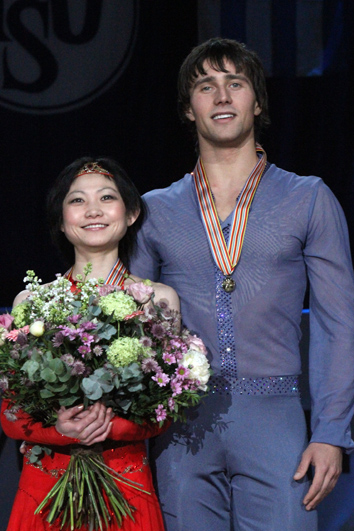
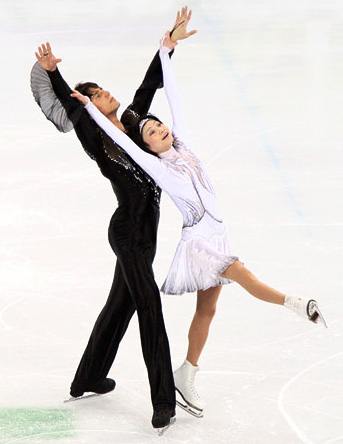
The 2009-10 season was pivotal for Kavaguti and Smirnov, culminating in their Olympic debut. They were assigned to the 2009 NHK Trophy in Japan, where they led after the short program. In the free skate, Kavaguti again fell on the quadruple throw, dislocating her shoulder. Despite the injury, the pair opted to continue after a two-minute medical break, ultimately winning the silver medal despite a three-point deduction. At the Cup of Russia, they secured another silver medal, finishing behind Pang Qing and Tong Jian. Their consistent Grand Prix performances qualified them for the Grand Prix Final, where they placed sixth in the short program and fifth in the free skate, ending up fifth overall for the third consecutive year.
Kavaguti and Smirnov clinched their third consecutive national title at the 2010 Russian Figure Skating Championships, winning both segments by over 11 points ahead of Mukhortova and Trankov. At the 2010 European Figure Skating Championships in Tallinn, Estonia, they were in a close second after the short program. Their free skate was nearly flawless, with only a minor step out on a triple toe loop from Kavaguti. Remarkably, Kavaguti's shoulder dislocated mid-program, but she managed to reset it and continue without interruption. They won their first European Championship title with a free skate score of 139.29 points, which was an ISU world record at the time.
At the 2010 Winter Olympics in Vancouver, Canada, Kavaguti and Smirnov entered the free skate in third place, just 2.5 points behind the leaders, Shen Xue and Zhao Hongbo. During the warm-up, their coach, Tamara Moskvina, reportedly instructed them not to attempt the quadruple throw, a decision that Kavaguti later stated affected her mental preparation. In the free skate, they encountered several mistakes: Kavaguti touched her hand down and stumbled on a triple Salchow, Smirnov stepped out of a double Axel, and Kavaguti fell on the final throw, dislocating her shoulder. Despite these errors, they continued the program. They ultimately finished fourth overall, missing a medal. Their performance, particularly the lack of a medal, marked the end of a long-standing streak of Olympic pair skating gold medals for Russia and the Soviet Union, which had spanned since the 1964 Winter Olympics. Despite this, they were the highest-placing Russian pair.
They concluded the season at the 2010 World Figure Skating Championships in Turin, Italy. Similar to their 2009 World Championships performance, they were second after the short program and, despite a fall in the free skate, secured their second consecutive World bronze medal, missing silver by less than a point.
5.5. 2010-11 Season
The 2010-11 season was impacted by significant injuries for both skaters. In April 2010, Kavaguti underwent shoulder surgery. Smirnov also suffered a groin injury, requiring treatment in Germany, and later sprained his ankle upon his return. These setbacks kept the pair off the ice for three months, forcing them to withdraw from 2010 Skate Canada International, one of their assigned Grand Prix events.
Their only Grand Prix competition that season was the Cup of Russia, where they finished first in the short program and won the free skate by over 17 points, marking their fifth medal at this event. Despite their victory, their withdrawal from Skate Canada prevented them from accumulating enough points to qualify for the Grand Prix Final. At the 2011 Russian Figure Skating Championships, they placed second after the short program. Mistakes on side-by-side jumps and a challenging lift left them nearly 4.50 points behind first place, and they ultimately finished second.
At the 2011 European Figure Skating Championships in Bern, Switzerland, Kavaguti and Smirnov were in second place behind Aliona Savchenko and Robin Szolkowy after the short program. They won the free skate but could not overcome the 2.82-point deficit, settling for a silver medal. Both of their programs earned them season's best scores.
The 2011 World Figure Skating Championships, originally scheduled for Tokyo in March, were relocated to Moscow in late April due to the devastating 2011 Tōhoku earthquake and tsunami. Kavaguti and Smirnov skated last in the short program but a fall by Smirnov on a step sequence placed them fifth. In the free skate, they scored 124.82 points, with a fall on a throw being their only significant error, ultimately finishing fourth overall. During the exhibition gala, Kavaguti notably skated to "Always With Me" (from the film Spirited Away), expressing her heartfelt thoughts for Japan after the disaster.
5.6. 2011-12 Season
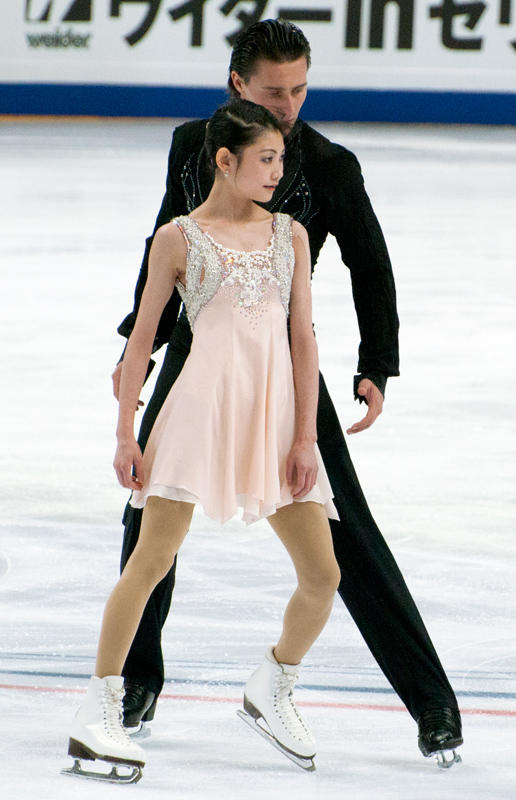
For the 2011-12 season, Kavaguti and Smirnov utilized the new option to compete in three Grand Prix events. They easily won their first event, the 2011 Cup of China, securing first place in both segments for a total score of 186.74 points. At their next event, the 2011 NHK Trophy in Sapporo, Japan, Kavaguti's fall on an under-rotated triple toe loop and lower levels on other elements placed them fifth in the short program. However, they rebounded to win the free skate and claimed the gold medal with a total of 177.51 points, surpassing reigning World Champions Aliona Savchenko and Robin Szolkowy. This victory qualified them for the Grand Prix Final. At the Cup of Russia, they placed second in both segments, earning silver with a total of 197.84 points, marking their sixth consecutive medal at this competition. At the Grand Prix Final in Quebec City, they placed fourth in the short program and third in the free skate, ultimately securing their first-ever Grand Prix Final medal - a bronze - with a total of 187.77 points.
On December 20, 2011, coach Tamara Moskvina announced that the pair had requested to be excused from the 2012 Russian Figure Skating Championships to allow Smirnov to recover from a knee injury that had emerged before the Grand Prix Final. Further complications arose when Smirnov underwent emergency surgery on January 4, 2012, to remove his appendix and address an intestinal hernia. As he could not recover in time for the 2012 European Figure Skating Championships, they were replaced by Ksenia Stolbova and Fedor Klimov.
Despite these significant health setbacks, Kavaguti and Smirnov competed at the 2012 World Figure Skating Championships in Nice, France, just twelve weeks after Smirnov's surgery. Although they were skating well in their short program, a bad fall at the end of a lift resulted in an eleventh-place finish. In their free program, an aborted lift received no points, contributing to a fourth-place finish in that segment. With errors in both programs' lifts, they were unable to medal, finishing seventh overall with a combined total of 182.42 points, 7.28 points shy of a podium spot.
5.7. 2012-13 Season
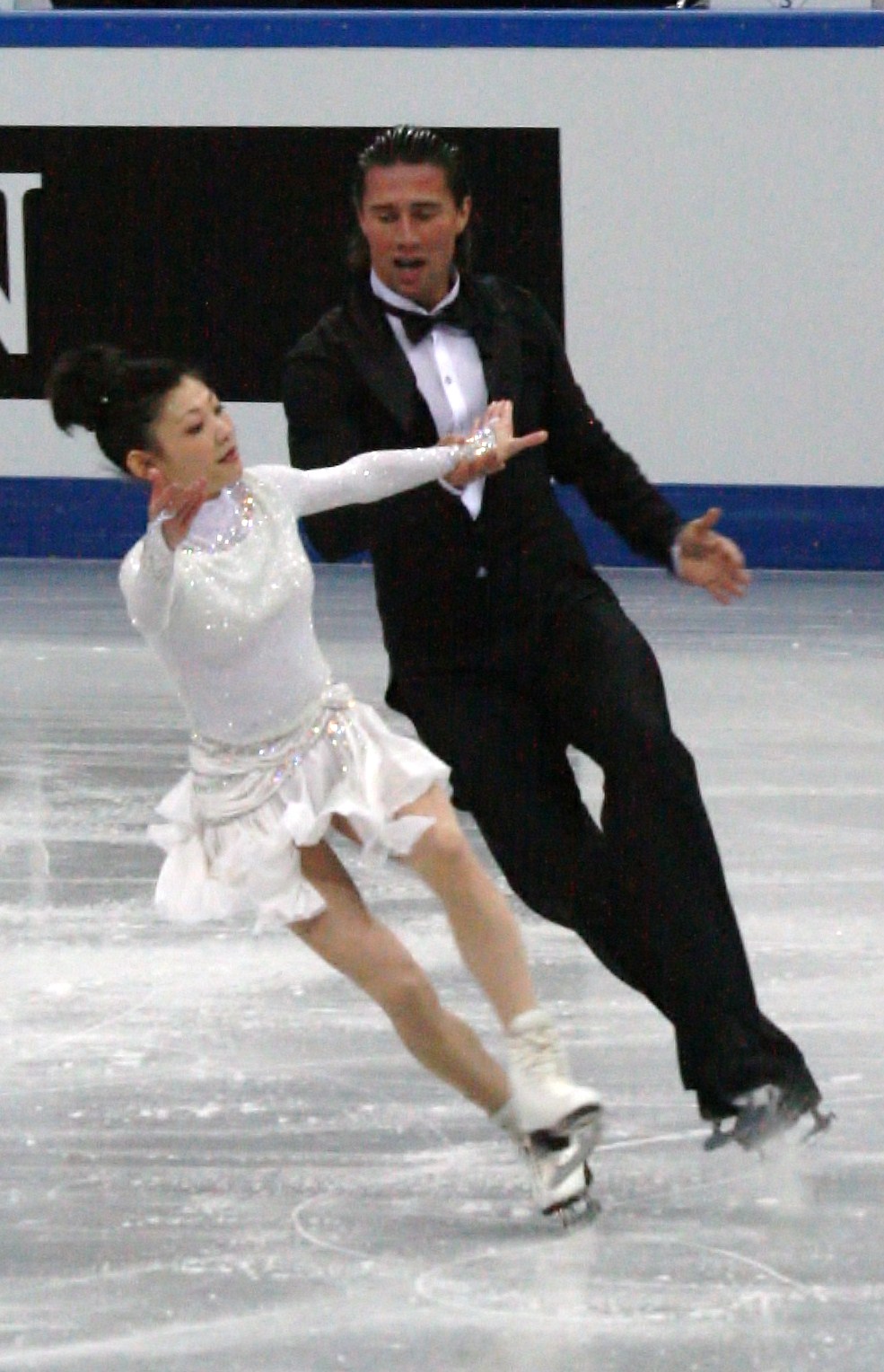
Ahead of the 2012-13 season, Alexander Smirnov underwent surgery on the meniscus in his right knee during the summer of 2012. After August test skates, the pair decided to change their planned short program from music from Cats to a Strauss waltz.
Their first Grand Prix event of the season was the 2012 Cup of China, where they placed second in both the short and free programs, earning a silver medal behind China's Pang and Tong. This was their second consecutive medal at this event. At the 2012 Trophée Éric Bompard in France, they were first after the short program. Although they placed second in the free skate behind Canada's Meagan Duhamel and Eric Radford, their strong short program score was sufficient to secure their first gold medal in France. At the 2012 Grand Prix Final in Sochi, Kavaguti and Smirnov scored 58.02 points in the short program due to a fall by Kavaguti on a throw and errors on triple toe loops by both skaters, placing them sixth. In the free skate, despite Kavaguti's only mistake being a doubled triple toe loop, low levels on some elements placed them fifth in that segment, and they finished sixth overall.
They then competed at the 2013 Russian Figure Skating Championships in Sochi. They placed second in the short program and had a nearly flawless free skate, with only Kavaguti's hand touching the ice on a throw jump. They scored 137.18 points in the free skate, winning the silver medal behind champions Tatiana Volosozhar and Maxim Trankov with a total of 207.37 points.
At the 2013 European Figure Skating Championships, Kavaguti and Smirnov had a disappointing short program, with Smirnov falling on the triple toe loop and Kavaguti stepping out of the triple loop throw. A poor ending to the death spiral and low levels resulted in a fifth-place finish in the short program. In the free skate, Smirnov singled a double Axel and then fell. They finished fifth in the free skate and fifth overall, marking the first time in five European Championships appearances that they failed to medal.
Kavaguti and Smirnov concluded their season at the 2013 World Figure Skating Championships in London, Ontario. They were fourth after the short program with a season's best score. During the free skate, while performing their final lift, Smirnov made contact with the boards and aborted the lift, which resulted in the element receiving a zero score. Coach Moskvina commented that the arena was unusually narrow. This error caused them to drop from fourth to sixth place with a final score of 191.59 points.
5.8. 2013-14 Season
The 2013-14 season was a period of severe setback for Kavaguti and Smirnov. They were initially assigned to the 2013 NHK Trophy and 2013 Skate Canada International, both events where they had previously achieved success. However, in October 2013, Smirnov suffered a ruptured patellar tendon during a fall while competing at the Panin Memorial in Saint Petersburg. This significant injury forced them to withdraw from all their Grand Prix assignments and miss the entire competitive season. Despite the severity of the injury, in April 2014, the pair announced their intention to return to competition for the 2014-15 season, setting their sights on the 2018 Pyeongchang Olympics.
5.9. 2014-15 Season
Kavaguti and Smirnov made a successful return to competition in the 2014-15 season, beginning at the 2014 Nebelhorn Trophy, an ISU Challenger Series event, where they won the gold medal with a total of 195.89 points. Their free skate at this event featured a successfully landed quadruple Salchow throw. They continued their strong comeback by winning gold at 2014 Skate America, their first Grand Prix assignment of the season. In the free skate there, they once again landed a quadruple Salchow throw, achieving a new personal best free skate score of 140.00 points. This victory made them the fifth pair in history to win all six Grand Prix events.
They then earned a silver medal at the 2014 NHK Trophy and finished sixth at the 2014-15 Grand Prix of Figure Skating Final. At the 2015 Russian Figure Skating Championships, the team placed third. Their season highlight came at the 2015 European Figure Skating Championships, where they won their second European title, securing first place after being second in the short program. They concluded their season with a fifth-place finish at the 2015 World Figure Skating Championships, and also contributed to Russia's silver medal at the World Team Trophy, where they placed third personally.
5.10. 2015-16 Season
Kavaguti and Smirnov had a strong start to the 2015-16 season, winning gold at the 2015 Mordovian Ornament, an ISU Challenger Series event. They followed this with a gold medal at their first Grand Prix assignment, the 2015 Cup of China. At this competition, they impressively upset the home favorites, Wenjing Sui and Han Cong, setting a new personal best overall score of 216.00 points. In their free skate, they made history by becoming the first pair to successfully land two quadruple throw jumps in a single program and the first to execute a quadruple throw loop.
At their next Grand Prix event, the 2015 Rostelecom Cup, they earned a silver medal behind their teammates Ksenia Stolbova and Fedor Klimov, which qualified them for the 2015-16 Grand Prix Final. In December, they secured a bronze medal at the Grand Prix Final in Barcelona, after placing second in the short program and third in the free skate. At the end of the month, they took silver at the 2016 Russian Figure Skating Championships, finishing second in both segments. However, a severe injury struck on January 20, 2016, when Kavaguti sustained a ruptured Achilles tendon during practice. This injury forced the pair to withdraw from the 2016 European Figure Skating Championships and brought their season to an abrupt end.
5.11. 2016-17 Season and Retirement
Kavaguti and Smirnov returned to international competition for the 2016-17 season at the 2016 CS Ondrej Nepela Memorial, an ISU Challenger Series event held from September 30 to October 2, 2016. They secured a silver medal, finishing behind their teammates Evgenia Tarasova and Vladimir Morozov.
However, this season proved to be more challenging for the pair. In the Grand Prix series, they failed to reach the podium at both their assigned events, a first for their partnership. Their performance at the 2016 Cup of China resulted in a sixth-place finish, and they placed fifth at 2016 Skate Canada International. At the 2017 Russian Figure Skating Championships, they finished fifth, marking the first time in their partnership that they did not earn a medal at the national championships.
On September 22, 2017, their coach, Tamara Moskvina, officially announced that Yuko Kavaguti and Alexander Smirnov had retired from competitive figure skating.
6. Post-Retirement Activities
Following her retirement from competitive figure skating, Yuko Kavaguti has engaged in various professional activities, both within and outside the sport.
6.1. Professional Skating and Coaching
After concluding her competitive career, Kavaguti transitioned into professional skating, making appearances in various ice shows. She has also dedicated her time to coaching junior skaters, contributing to the development of the next generation of talent. In November 2018, her expertise was formally recognized when she received approval from the Saint Petersburg Skating Federation to serve as a technical specialist in figure skating. Beyond direct coaching, Kavaguti has engaged in educational and media roles. In Japan, she conducted lectures at the Asahi Culture Center in Shinjuku during 2017 and 2018. She has also served as a commentator for the pair and exhibition events at the NHK Trophy in 2018 and 2019, sharing her insights with audiences.
6.2. Other Professional Pursuits
Beyond her continued involvement in figure skating, Yuko Kavaguti has also embarked on a unique career path. Her current primary occupation is providing facial massage services at a beauty salon located in the center of Saint Petersburg. Kavaguti explained her decision to pursue this field, stating that the COVID-19 pandemic made her realize the importance of having work outside of skating. She also noted that during her competitive days, she found that receiving facial massages made her feel "completely different" when stepping onto the ice, recognizing the significant positive impact it had on her well-being.
7. Awards and Honors
Throughout her distinguished career, Yuko Kavaguti received several notable awards and honors in recognition of her contributions and achievements in figure skating.
- Order of the President of the Russian Federation "For services to the development of physical culture and sports, high athletic achievements at the XXI Olympic Games 2010 in Vancouver"** (March 5, 2010)
- The Best in the Sport of St. Petersburg** (February 2010)
- Honored Master of Sports of Russia** (2009)
8. Programs
Yuko Kavaguti's competitive career featured a variety of programs set to diverse musical selections and choreographed by acclaimed professionals.
8.1. With Alexander Smirnov

| Season | Short Program | Free Skating | Exhibition |
|---|---|---|---|
| 2016-2017 | All Alone | Clair de Lune | |
| 2015-2016 | I Finally Found Someone | Manfred Symphony | Dark Eyes |
| 2014-2015 | Méditation | Manfred Symphony | Habanera from Carmen |
| 2013-2014 | Katyusha | Manfred Symphony | Dark Eyes |
| 2012-2013 | The Blue Danube | February | You Raise Me Up |
| 2011-2012 | All Alone | Clair de Lune | Dark Eyes |
| 2010-2011 | Also sprach Zarathustra | Clair de Lune | Always With Me |
| 2009-2010 | The Swan | The Blue Danube | The Blue Danube |
| 2008-2009 | Pagliacci | The Prophet/Still Got the Blues | The Blue Danube |
| 2007-2008 | Introduction and Rondo Capriccioso | Love Story | Sirtáki |
| 2006-2007 | Piano Concerto | Bachianas Brasileiras |
8.2. With Alexander Markuntsov
| Season | Short Program | Free Skating | Exhibition |
|---|---|---|---|
| 2002-2003 | Spring Water | Those Are The Nights | |
| 2001-2002 | Aida | Carmen | Barbie Girl |
| 2000-2001 | Fascination | Spartacus |
9. Competitive Results
This section presents comprehensive tables of Yuko Kavaguti's competitive results throughout her career.
GP: Grand Prix; CS: Challenger Series
9.1. With Alexander Smirnov (Representing Russia)
| International | |||||||||||
|---|---|---|---|---|---|---|---|---|---|---|---|
| Event | 06-07 | 07-08 | 08-09 | 09-10 | 10-11 | 11-12 | 12-13 | 13-14 | 14-15 | 15-16 | 16-17 |
| Olympics | 4th | ||||||||||
| Worlds | 9th | 4th | 3rd | 3rd | 4th | 7th | 6th | 5th | |||
| Europeans | 3rd | 2nd | 1st | 2nd | WD | 5th | 1st | WD | |||
| GP Final | 5th | 5th | 5th | 3rd | 6th | 6th | 3rd | ||||
| GP Bompard | 1st | ||||||||||
| GP Cup of China | 1st | 2nd | 1st | 6th | |||||||
| GP NHK Trophy | 2nd | 1st | WD | 2nd | |||||||
| GP Rostel. Cup | 3rd | 3rd | 2nd | 2nd | 1st | 2nd | 2nd | ||||
| GP Skate America | 1st | ||||||||||
| GP Skate Canada | 3rd | 1st | WD | WD | 5th | ||||||
| CS Mordovian | 1st | ||||||||||
| CS Nebelhorn | 1st | ||||||||||
| CS Nepela Memorial | 2nd | ||||||||||
| Cup of Nice | 1st | 1st | 1st | ||||||||
| National | |||||||||||
| Russian Champ. | WD | 1st | 1st | 1st | 2nd | WD | 2nd | 3rd | 2nd | 5th | |
| Team events | |||||||||||
| World Team | |||||||||||
| TBD = Assigned; WD = Withdrew | |||||||||||
9.2. With Alexander Markuntsov (Representing Japan)
GP: Grand Prix; JGP: Junior Grand Prix
| Results | |||||||
|---|---|---|---|---|---|---|---|
| International | |||||||
| Event | 2000-2001 | 2001-2002 | 2002-2003 | ||||
| Worlds | 15th | 13th | 14th | ||||
| Four Continents | 8th | 9th | 7th | ||||
| GP NHK Trophy | WD | 5th | |||||
| GP Skate America | 6th | 5th | |||||
| GP Trophée Lalique | 6th | ||||||
| International: Junior | |||||||
| Junior Worlds | 2nd | ||||||
| JGP Final | 3rd | ||||||
| JGP China | 3rd | ||||||
| JGP Mexico | 1st | ||||||
| National | |||||||
| Japan Champ. | 1st | 1st | |||||
| Japan Junior | 1st | ||||||
| WD = Withdrew | |||||||
9.3. With Devin Patrick (Representing USA and Japan)
| National | ||
|---|---|---|
| Event | 2004-05 | 2005-06 |
| U.S. Champ. | 15th | |
| Japanese Champ. | 1st | |
| Midwestern Sectionals | 2nd | |
9.4. Singles Skating Career (Representing Japan)
JGP: Junior Grand Prix
| International | |||
|---|---|---|---|
| Event | 1996-97 | 1997-98 | 1998-99 |
| JGP Hungary | 8th | ||
| JGP Mexico | 1st | ||
| National | |||
| Japan Junior Champ. | 10th | 3rd | 10th |
9.5. Detailed Results
(Small medals for short and free programs awarded only at ISU Championships - Worlds, Europeans, and Junior Worlds. At team events, medals awarded for team results only.)
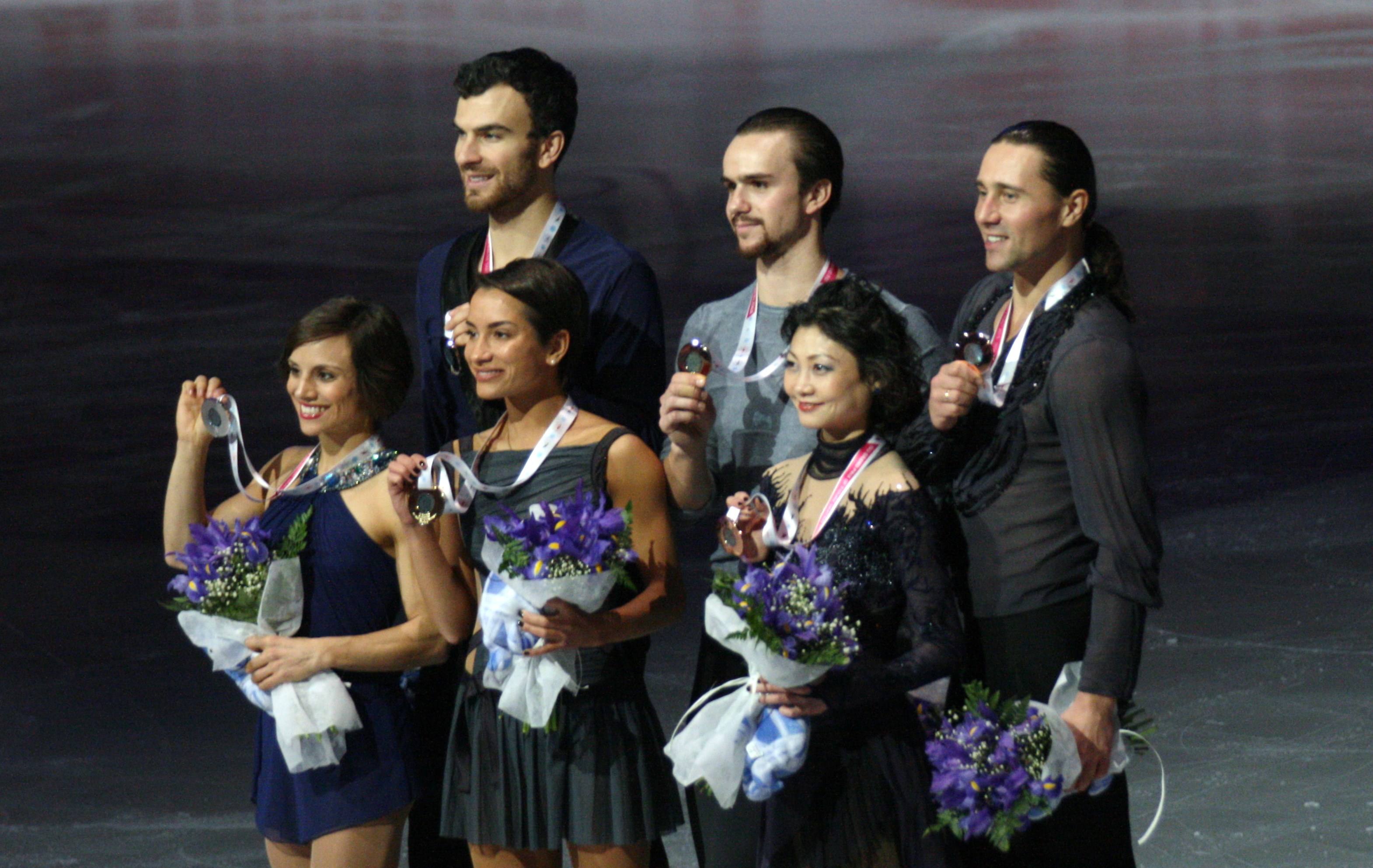
| 2016-17 Season | ||||
|---|---|---|---|---|
| Date | Event | Short Program (SP) | Free Skating (FS) | Total Score |
| December 20-26, 2016 | 2017 Russian Championships | 5 | 5 | 5 |
| November 18-20, 2016 | 2016 Cup of China | 6 | 6 | 6 |
| October 28-30, 2016 | 2016 Skate Canada | 5 | 6 | 5 |
| September 30 - October 2, 2016 | 2016 CS Ondrej Nepela Memorial | 2 | 2 | 2 |
| 2015-16 Season | ||||
| Date | Event | Short Program (SP) | Free Skating (FS) | Total Score |
| December 23-27, 2015 | 2016 Russian Championships | 2 | 2 | 2 |
| December 10-13, 2015 | 2015-16 Grand Prix Final | 2 | 3 | 3 |
| November 20-22, 2015 | 2015 Rostelecom Cup | 2 | 2 | 2 |
| November 5-8, 2015 | 2015 Cup of China | 2 | 1 | 1 |
| October 15-18, 2015 | 2015 Mordovian Ornament | 1 | 1 | 1 |
| 2014-15 Season | ||||
| Date | Event | Short Program (SP) | Free Skating (FS) | Total Score |
| April 16-19, 2015 | 2015 World Team Trophy | 3 | 4 | 2T/3P |
| March 23-29, 2015 | 2015 World Championships | 4 | 6 | 5 |
| January 26 - February 1, 2015 | 2015 European Championships | 2 | 1 | 1 |
| December 24-28, 2014 | 2015 Russian Championships | 2 | 3 | 3 |
| December 11-14, 2014 | 2014-15 ISU Grand Prix Final | 6 | 4 | 6 |
| November 28-30, 2014 | 2014 NHK Trophy | 2 | 3 | 2 |
| October 24-26, 2014 | 2014 Skate America | 1 | 1 | 1 |
| September 25-27, 2014 | 2014 Nebelhorn Trophy | 1 | 1 | 1 |
| 2012-13 Season | ||||
| Date | Event | Short Program (SP) | Free Skating (FS) | Total Score |
| March 13-15, 2013 | 2013 World Championships | 4 | 7 | 6 |
| January 23-27, 2013 | 2013 European Championships | 5 | 5 | 5 |
| December 25-28, 2012 | 2013 Russian Championships | 2 | 2 | 2 |
| December 6-9, 2012 | 2012-13 Grand Prix Final | 6 | 5 | 6 |
| November 15-18, 2012 | 2012 Trophée Éric Bompard | 1 | 2 | 1 |
| November 2-4, 2012 | 2012 Cup of China | 2 | 2 | 2 |
| 2011-12 Season | ||||
| Date | Event | Short Program (SP) | Free Skating (FS) | Total Score |
| March 26 - April 1, 2012 | 2012 World Championships | 11 | 4 | 7 |
| December 8-11, 2011 | 2011-12 Grand Prix Final | 4 | 3 | 3 |
| November 25-27, 2011 | 2011 Rostelecom Cup | 2 | 2 | 2 |
| November 11-13, 2011 | 2011 NHK Trophy | 5 | 1 | 1 |
| November 4-6, 2011 | 2011 Cup of China | 1 | 1 | 1 |
| 2010-11 Season | ||||
| Date | Event | Short Program (SP) | Free Skating (FS) | Total Score |
| April 27 - May 1, 2011 | 2011 World Championships | 5 | 4 | 4 |
| January 24-30, 2011 | 2011 European Championships | 2 | 1 | 2 |
| December 26-29, 2010 | 2011 Russian Championships | 2 | 2 | 2 |
| November 19-22, 2010 | 2010 Rostelecom Cup | 1 | 1 | 1 |
| 2009-10 Season | ||||
| Date | Event | Short Program (SP) | Free Skating (FS) | Total Score |
| March 22-28, 2010 | 2010 World Championships | 2 | 3 | 3 |
| February 14-27, 2010 | 2010 Olympic Winter Games | 3 | 7 | 4 |
| January 18-24, 2010 | 2010 European Championships | 2 | 1 | 1 |
| December 24-29, 2009 | 2010 Russian Championships | 1 | 1 | 1 |
| December 3-6, 2009 | 2009-10 Grand Prix Final | 6 | 5 | 5 |
| November 5-8, 2009 | 2009 NHK Trophy | 1 | 2 | 2 |
| October 22-25, 2009 | 2009 Rostelecom Cup | 2 | 2 | 2 |
| 2008-09 Season | ||||
| Date | Event | Short Program (SP) | Free Skating (FS) | Total Score |
| April 15-19, 2009 | 2009 World Team Trophy | 2 | 2 | 5T/2P |
| March 22-29, 2009 | 2009 World Championships | 2 | 3 | 3 |
| January 20-25, 2009 | 2009 European Championships | 3 | 2 | 2 |
| December 24-28, 2008 | 2009 Russian Championships | 2 | 1 | 1 |
| December 10-14, 2008 | 2008-09 Grand Prix Final | 6 | 4 | 5 |
| November 20-23, 2008 | 2008 Cup of Russia | 2 | 1 | 2 |
| October 30 - November 2, 2008 | 2008 Skate Canada | 1 | 2 | 1 |
| October 15-19, 2008 | 2008 Coupe de Nice | 2 | 1 | 1 |
| 2007-08 Season | ||||
| Date | Event | Short Program (SP) | Free Skating (FS) | Total Score |
| March 16-23, 2008 | 2008 World Championships | 3 | 4 | 4 |
| January 21-27, 2008 | 2008 European Championships | 4 | 3 | 3 |
| January 3-7, 2008 | 2008 Russian Championships | 1 | 1 | 1 |
| December 13-16, 2007 | 2007-08 Grand Prix Final | 6 | 5 | 5 |
| November 22-25, 2007 | 2007 Cup of Russia | 4 | 3 | 3 |
| November 1-4, 2007 | 2007 Skate Canada | 3 | 3 | 3 |
| October 18-21, 2007 | 2007 Coupe de Nice | 1 | 1 | 1 |
| 2006-07 Season | ||||
| Date | Event | Short Program (SP) | Free Skating (FS) | Total Score |
| March 19-25, 2007 | 2007 World Championships | 4 | 10 | 9 |
| November 23-26, 2006 | 2006 Cup of Russia | 3 | 3 | 3 |
| November 9-11, 2006 | 2006 Coupe de Nice | 1 | 1 | 1 |
- Personal best highlighted in bold
- World record highlighted in bold italics